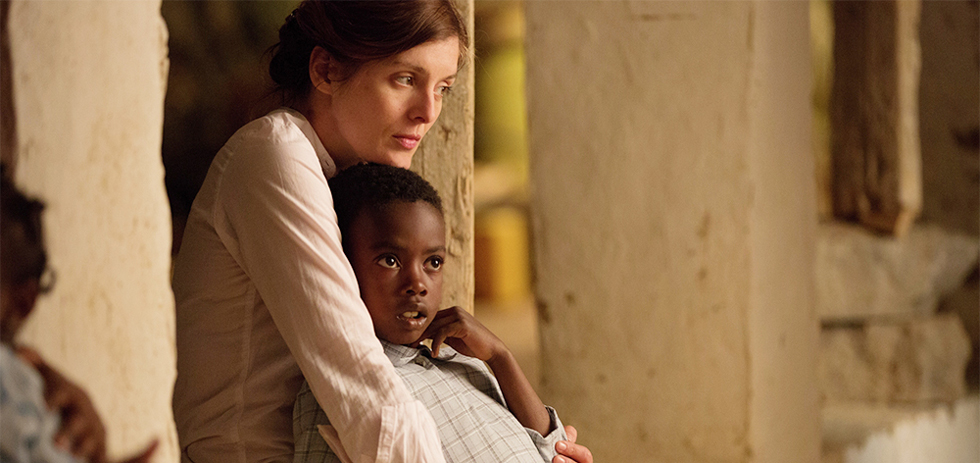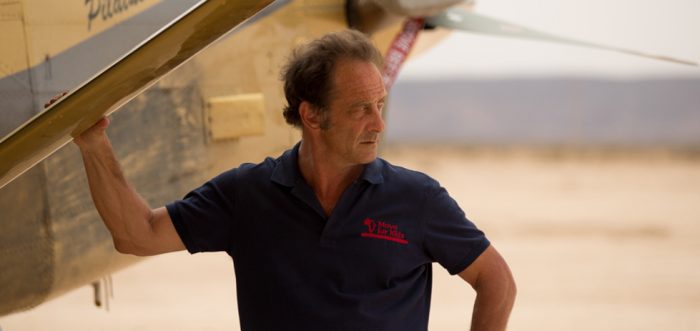
Joachim Lafosse must have transcultural adoption on the brain – that is to say, the fostering of children across borders. For proof, consider the Belgian filmmaker’s fourth (and previous) feature, Our Children, a gentle gaze at the marriage, misery and eventual murder-attempted suicide of Genevieve Lhermitte and her five unfortunate children in 2007. But where Genevieve’s victims are borne of her body, their natural father Mounir can’t say the same of the only dad he has ever known. Born in Morocco but raised in Belgium by a generous yet possessive physician, Mounir enjoys pleasures and prospects that his birthplace may never have offered while simultaneously being smothered by Dr Pinget’s entitled benevolence. With 2015’s The White Knights, Lafosse rewinds the timeline and explores how a newer generation of Mounirs might find their way into the same trap of privilege and paternalism – or not – and, in doing so, crafts an almost grudging heist picture dressed-up as a fairly nuanced issue drama.
Unlike so many films inspired by “true events,” no mention is made of the 2007 humanitarian fiasco whose dumbfounding turn of events Lafosse and Co straightforwardly reimagine in The White Knights. Accordingly, the general synopsis for both the factual and the fictionalised versions is that a team of aid workers/mercenaries (wherever one’s opinion sits) attempt to smuggle a hoard of orphans out of warring Chad into the expectant hands of French would-be parents. There are conflict diamonds, and there is this.
Perhaps this decision to eschew disclaimers and captions is merely an element of the director’s characteristic understatement, or maybe it reflects a pushy presumption on the part of the filmmakers that the now-defunct NGO Zoé’s Ark should need no introduction. Whatever the reason, the resulting headlong dive into socio-political murk suggests that The White Knights is designed less for the purpose of recounting a historical event beat for beat, and more for reflecting on and reconsidering the maddening moral puzzle surrounding said event. Not that the film is beyond indulging the ticking-clock tension that patiently leads to a climax worthy of a mellower Kathryn Bigelow.
The Chad of this movie (as shot handheld in Morocco) is indifferent in its aridity. City and wilderness are much the same as earthen buildings are gunned and shelled back into dust; exactly the kind of purgatorial backdrop in which moral slippage seems inevitable. And sandwiched between these desert expanses and a no-nonsense sky are gun-toting militia, displaced peoples and circling expatriates. Right in the mix, the gruff face of Vincent Lindon as Jacques, a founding member of the awkwardly named Move for Kids, an NGO offering long-term refuge for orphans but with secret, slimy motives. Jacques’ creviced, stubbled mug is a perfect visual foil, possible to read as both deeply principled and aggressively profiteering and therefore difficult to place altogether. Contrast this with the unambiguous righteous bluster of Louise Bourgoin’s Laura and one can deduce the spectrum of personalities that exist within the bickering but bound-by-sin collective. Clearly, all willing parties consider their actions to be some variation on civil disobedience as they flaunt the bounds of legality in service of ‘the children’. But the moral inconsistencies quickly begin to nag and itch, in particular, the purported interest in the wellbeing of orphans without any concurrent respect for the children’s culture and compatriots. It’s as if these tiny, shell-shocked beings are symbols of an ideal first and foremost, adorable puppies second and some version of human last.

When a film with this particular narrative sports the words ‘White Knights’ in its title, the mind is promptly awash with images of crusading colonialists bringing the gifts of Christianity and smallpox in exchange for ore and cocoa…and of Klansmen. Lafosse’s film does not shy from this connotation as he, with his politely unsettled and somewhat nosy shooting style, sits in on Jacques and friends cyclically discussing infants in the manner of merchandise. Clinging onto their high-minded sense of altruism as though onto moral buoys, the aid workers pay local chieftain, Olafi, for his orphan-finding services but not for the orphans themselves, Jacques stresses. They even turn away genuine orphans due to their being older than five years of age, a duplicitous stance which begets one of the film’s briefest but most sobering lines of dialogue. And when an attack on a local village lands injured toddlers (read: damaged goods) in their laps, Move for Kids is afforded a modest chance at redemption which its members dutifully accept as though medical attention were a distraction from real humanitarian work.
Yet, like Ulrich Seidl’s Paradise: Love in which a dumpy Austrian divorcee travels to Kenya to buy love and sex only to realise than she has in fact been bought by the presumed product, The White Knights’s only true victims are the kids, because the exploitation is otherwise weirdly mutual. With Olafi knowingly ‘selling’ non-orphaned and/or ‘over age’ children to Move for Kids, he and the aid workers could not be better-matched bedfellows. In truth, Olafi’s ‘disobedience’ is predicated on his very reasonable expectations of western aid, and his crookery forces his business partners to confront their own deeper crookery. Even the ultimate undoing of Move for Kids’ heist is a direct consequence of Jacques and Laura’s insulting belief in the corruptible subservience and impotence of their local translator Bintou. It seems that, in times of war, trust dies first.
Lafosse’s performance-reliant approach is honoured by a very committed set of acting turns, Lindon’s in particular, as well as Valerie Donzelli playing Françoise, the face of journalistic complicity and amorality. Neither sloppy nor exacting, Lafosse’s framing seeks out faces and interactions more than it does artful compositions, hoping to perhaps to glean – from the tiniest gesture or line of rhetoric – how goodwill and exploitation can coexist almost symbiotically within the same mind, the same group, the same society at large. Well, it would seem that benevolence continues to be a dinted and bruised suit of armour shielding the heart of paternalism.
